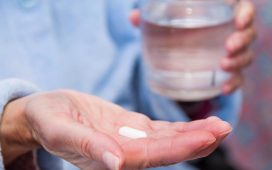Here are what the editors at HealthDay consider to be the most important developments in Anesthesiology for February 2018. This roundup includes the latest research news from journal articles, as well as the FDA approvals and regulatory changes that are the most likely to affect clinical practice.
Oral Intake During Labor Shows No Increase in Adverse Outcomes
WEDNESDAY, Feb. 28, 2018 (HealthDay News) — Ad lib oral intake during labor does not increase maternal or neonatal adverse outcomes compared with allowing women nothing by mouth during labor, according to a study published in the March issue of the American Journal of Nursing.
Early Studies Often Show Exaggerated Treatment Effect
TUESDAY, Feb. 27, 2018 (HealthDay News) — Trials to evaluate drugs or devices used to treat chronic medical conditions that are published early in the chain of evidence often show an exaggerated treatment effect compared with subsequent trials, according to research published online Feb. 21 in the Mayo Clinical Proceedings.
Recommendations for Optimizing Hidden Curriculum in Medicine
MONDAY, Feb. 26, 2018 (HealthDay News) — In a position paper published online Feb. 27 in the Annals of Internal Medicine, the American College of Physicians (ACP) presents recommendations for optimizing clinical learning environments by fostering a positive hidden curriculum in medicine.
Editorial (subscription or payment may be required)
Artificial Intelligence May Help Prevent Physician Burnout
FRIDAY, Feb. 23, 2018 (HealthDay News) — Artificial intelligence (AI), in which computers can be trained to recognize patterns in large quantities of data, may be able to reduce physicians’ burdens, saving them time and energy, according to a report published in Medical Economics.
Peds Cardiac Surgery Outcomes Vary by Neighborhood Income
FRIDAY, Feb. 23, 2018 (HealthDay News) — Children undergoing cardiac surgery from the lowest-income neighborhoods have worse outcomes, according to a study published online Feb. 22 in Pediatrics.
CDC: No Change in Percentage of Uninsured in U.S. From ’16 to ’17
THURSDAY, Feb. 22, 2018 (HealthDay News) — The percentage of uninsured U.S. persons of all ages did not change significantly from 2016 to the first nine months of 2017, according to a report published online Feb. 22 by the National Center for Health Statistics.
Perioperative Glucose but Not A1C Predicts Surgical Outcomes
WEDNESDAY, Feb. 21, 2018 (HealthDay News) — Perioperative glucose predicts 30-day mortality linearly in noncardiac surgical patients and nonlinearly in cardiac surgical patients, according to a study published online Feb. 13 in Diabetes Care.
Burnout Found Prevalent Among Doctors in Single Health System
TUESDAY, Feb. 20, 2018 (HealthDay News) — Burnout is prevalent among physicians, affecting over one-third of physicians in a single health system, and is associated with health care delivery, according to a research letter published online Feb. 19 in JAMA Internal Medicine.
Opioids Plus Acetaminophen, Ketorolac Cost-Effective Post-Sx
THURSDAY, Feb. 15, 2018 (HealthDay News) — Intravenous acetaminophen with or without ketorolac is associated with reduced opioid consumption and cost of care after scoliosis surgery in adolescents, compared with opioids alone, according to a study published online Jan. 29 in Pediatric Anesthesia.
Full Text (subscription or payment may be required)
Four Best Practices Outlined to Prevent Health Care Cyberattacks
TUESDAY, Feb. 13, 2018 (HealthDay News) — Four best practices outlined that can help prevent health care cyberattacks, which increased from 2016 to 2017, according to a report published in Managed Healthcare Executive.
EHRs Not Sufficient to Ensure Success in Value-Based Care
MONDAY, Feb. 12, 2018 (HealthDay News) — Electronic health records (EHRs) are not sufficient to ensure success in value-based care, according to an article published in Medical Economics.
Poll: Personal Beliefs Shouldn’t Allow Doctors to Refuse to Treat
THURSDAY, Feb. 8, 2018 (HealthDay News) — Most people do not believe that professionals including health care providers should be allowed to refuse to provide services based on their conscience or beliefs, according to a recent HealthDay/The Harris Poll.
Ketamine + Propofol Speeds Recovery for Peds MRI Sedation
WEDNESDAY, Feb. 7, 2018 (HealthDay News) — Use of ketamine at induction followed by reduced propofol infusion rate for maintenance is associated with shorter recovery times for children undergoing magnetic resonance imaging with deep sedation, according to a study published online Jan. 27 in Pediatric Anesthesia.
Full Text (subscription or payment may be required)
Humanities Exposure Positively Impacts Medical Students
MONDAY, Feb. 5, 2018 (HealthDay News) — Exposure to the humanities correlates with less burnout and higher levels of positive personal qualities among medical students, according to a study published online Jan. 29 in the Journal of General Internal Medicine.
Factors Identified That Impact Physicians IT Adoption
FRIDAY, Feb. 2, 2018 (HealthDay News) — Physicians have considerable concerns about the efficacy and evidence base of health information technology (IT), according to a report published by the American Medical Association (AMA).
Medicaid Expansion Cuts Out-of-Pocket Spending
THURSDAY, Feb. 1, 2018 (HealthDay News) — States that expanded Medicaid cut the probability of non-elderly near-poor adults being uninsured and lowered average out-of-pocket spending, according to a study published online Jan. 24 in Health Affairs.
Persistent Pain Common 1 Month After Elective Pediatric Surgery
THURSDAY, Feb. 1, 2018 (HealthDay News) — Many pediatric patients have persistent pain after common ambulatory surgeries, according to a study published online Jan. 20 in Pediatric Anesthesia.
Copyright © 2018 ScoutNews, LLC. All rights reserved.







